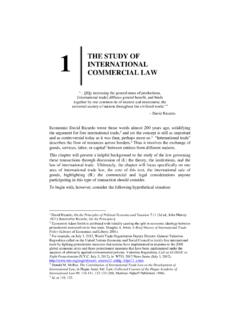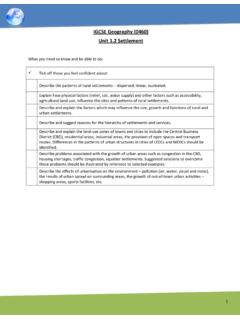Transcription of China as “Victim”? The Opium War That Wasn’t
1 Center for European Studies Working Paper Series #136 China as Victim ? The Opium War that Wasn t by Harry G. Gelber Visiting Scholar, Center for European Studies Harvard University Sandy Bay Road Sandy Bay, Tasmania 7005, Australia Abstract The 1840-42 Anglo-Chinese war (the so-called Opium War ) is almost universally believed to have been triggered by British imperial rapacity and determination to sell more and more Opium into China . that belief is mistaken. The British went to war because of Chinese military threats to defenseless British civilians, including women and children; because China refused to negotiate on terms of diplomatic equality and because China refused to open more ports than Canton to trade, not just with Britain but with everybody.
2 The belief about British guilt came later, as part of China s long catalogue of alleged Western exploitation and aggression. China s rise in recent years has attracted intense international attention. There are many reasons. One is the ancient idea that because China has a very large popu-lation, huge territory, a fascinating record in art and literature, and a long history of East Asian dominance, it is necessarily destined to be a great modern global power. In addition, there is China s large and growing importance in international trade and finance.
3 There is the evident energy and dynamism of China s people. But together with these comes a widespread conviction that China has been unfairly oppressed and ex-ploited by the West, in ways that merit redress. The origins of this notion go back to the nineteenth century, and the long decline and collapse of the last imperial dynasty, the Qing. A major item in the indictment is Britain s behavior before, during and after the 1840-42 Anglo-Chinese conflict, the Opium War. It s a brilliantly snappy name that sneakily prejudges the issue in very simple form: while China had done Britain no harm, the British gratuitously invaded China .
4 Britain wanted to expand its imperial power and sell more goods, especially the Opium whose import the Chinese tried to ban, while the British sold or smuggled in anyway. In other words, it was a case of commercial and imperialist British greed trying to force Opium on the Chinese. The world is wrong. The British decision to go to war had quite different causes. First, Opium . In China , it was a normal item of use and trade for centuries before the 1840 war. Not until the later 1790s did the Chinese court start to worry about its growing and intensive use. In the 1820s it began seriously to prohibit Opium imports, though the bans entirely failed to stop Chinese people from growing or buying it in in-creasing quantities.
5 Still less did it stop Chinese citizens, merchants, gangs and hordes of officials from ignoring the prohibitions and smuggling it into the country. Even sen-ior officials in charge of coastal protection grew very rich indeed from smuggling, or smugglers kickbacks. In the later 1830s the emperor s most senior advisers debated whether it would be better to enforce the Opium prohibitions or to legalize, regulate and tax the trade. Not until 1838-39 did the emperor finally opt for enforcement and send the admirable Commissioner Lin to Canton to see to it. The most important official concerns were two.
6 One was the damage done to the health and capacity for work of the people using Opium , especially the addicts. The other was the economic damage done by the Opium trade. Most importantly, too much silver was being paid to foreign merchants for Opium , and thus leaving China . The do-mestic price of silver was therefore going up. But the price of everyday copper cash re-mained the same. So tax payments, which had to be made in silver, were effectively tax increases, causing much popular resentment and social unrest. that assessment was almost certainly in important respects wrong. The matter cannot be proved one way or the other, but the circumstances of the time suggest the 2 following.
7 We know that the 1820s and 1830s were a time of social unrest and distur-bance in the Chinese empire, with various rebellious groups appearing from time to time, not least in the South. It would be normal at such times for some people to use Opium to relieve stress, much as the modern world has used Valium. Such a process could help to account for the startling rate of increase in Opium sales at Canton at the end of the 1820s. Furthermore, Opium and general trading , or smuggling, was by no means confined to Canton (modern Guangzhou) but was happening in dozens of inlets and small places along the coast.
8 It is beyond belief that the central Chinese authorities, who to this day do not have reliable statistics on most aspects of the Chinese economy, had more than a hazy idea of what was going on, let alone accurate statistics about the Opium trade and its effects on the silver supply. What may be slightly more reliable are the numbers for Opium shipments to China from India and, maybe, Turkey, and they tell an interesting tale. The available estimates suggest that , in 1800-1801, some 4570 chests of opium1 were shipped from these sources to China . Twenty years later, in 1820-1821, the total was much the same: 4244 chests.
9 Yet by 1830-1831 that had suddenly more than quadrupled, to 18,956 chests and, by 1838-1839, on the eve of the Sino-British conflict, even that had more than doubled to 40,200 The question is: why? It goes without saying that if such a drug is available, some people will experi-ment with it and a few will become addicted, but the most likely explanation for such soaring demand may well be Opium s use to relieve personal and social stress of various kinds. It seems difficult otherwise to explain consumption multiplying by no less than ten in a mere twenty years.
10 Whether that hypothesis is correct or not, there is another and equally important factor: the tea trade. We know that much and perhaps most of the silver that the mer-chants earned from selling Opium was immediately spent again on buying tea, for which there was a ravenous demand in England. Insofar as that was done at Canton, more or less reliable figures may be available. For the wider trades that went on along the coast, perhaps unofficially, numbers must be mere guesswork. What seems certain is that if there was indeed social disruption and even turmoil, a good deal of the silver earned by locals, whether for tea or anything else, would have immediately disap-peared without being reflected in official accounts.




